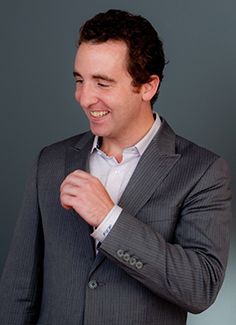Lifestyle
Copyright@ Australian Catholic University 1998-2026 | ABN 15 050 192 660 CRICOS registered provider: 00004G | PRV12008
Copyright@ Australian Catholic University 1998-2026 | ABN 15 050 192 660 CRICOS registered provider: 00004G | PRV12008

Is there anything more divisive and vitriolic than the vaccination debate?
Every hour of every day on Twitter, Facebook and the comments sections of news sites, keyboard warriors go into battle debating the pros and cons of immunisation.
High on emotion and low in civility, these conversations commonly descend to name-calling and nastiness.
“It’s an extremely polarised discussion,” says Mark Alfano, Professorial Fellow at ACU’s Dianoia Institute of Philosophy. “People tend to be there just to argue and shout.”
Professor Alfano would know. In the past few years, he and his co-researchers have spent days trawling Twitter for accounts spouting pro and anti-vaccination messages.
But rather than discovering scores of people on either side engaging in fierce debate, he found that both pro and anti-vaxxers tend to yell into their own echo chambers.
“The two sides basically don't talk to each other,” he says. “There's a tiny amount of crosstalk, but almost nothing, and there's no one in the middle taking a mixed position.”
It’s called confirmation bias, the phenomenon that prompts people to seek out information that supports their own views.
On Twitter and Facebook, that means only following accounts or joining groups that confirm what you already believe to be true.
“There’s this feedback loop, where people stop listening to those who disagree with them,” Professor Alfano says. “And if everyone I'm hearing from is telling me that something is dangerous or unsafe, then I'm going to be more likely to think, ‘well, that's just the way it is’.”

Despite widespread agreement in the scientific community that vaccines are safe, a reluctance to immunise appears to be growing.
In parts of the United States and New Zealand, vaccine-preventable diseases like the measles are making a comeback.
Is social media to blame?
Not entirely. The anti-vaccine movement has been around since the very first vaccine.
But the proliferation of global digital communities has certainly contributed to the rise in vaccine hesitancy.
“Social media has made it possible for there to be many more bubbles and more extreme bubbles,” Professor Alfano says.
“If there's only 20 people in the world who share my bizarre belief and I'm constrained geographically, I probably don't live next to them. But if I'm not constrained geographically, we can find each other and tell each other that we've been right all along, while everyone else was wrong.”
The trend has many scientists and public health advocates worried.
Professor Alfano shares their concerns. And he has a plan to burst that bubble.
He and his co-researchers at ACU are developing an algorithm to find people who have sway in the anti-vaccination community, but who display a semblance of open-mindedness.
The algorithm will mine people’s digital footprint to look for signals — words, phrases, punctuation and emojis — associated with broad-mindedness and intellectual humility.

“For instance, if someone on an anti-vaccination account is writing in all caps, that’s a pretty good sign that they're not particularly open-minded, and we won’t manage to convince them of anything,” Professor Alfano says.
The algorithm will filter out these hard-core anti-vaxxers and concentrate on the fence sitters: parents who are genuinely concerned about the safety of their children, or those who worry about vaccines but don’t know what, or who, to believe.
Those who fit the bill will be targeted with messages and adverts in the hope they will change their minds and go on to spread a pro-vaccination message to others in the community, who already trust them.
“It’s crucial that we find these people, who are still potentially quite influential within the anti-vaccine community, but who might be receptive to evidence and discussion,” he adds.
In this debate, emotion often trumps facts, so the messages will be tuned to convey compassion and trustworthiness.
“A lot of the research on persuasion shows the most persuasive messages are not necessarily the things that would convince a scientist, like hard data and facts, but more like stories and narratives and connection to the storyteller that makes them seem trustworthy,” Professor Alfano says.
“So we’ll be trying to craft messages that are persuasive, but that are also honest and trustworthy, because without trust, none of this is going to work.”
The three-year project, which is funded by the Federal Government and the Templeton Foundation, is due to begin in January 2020.
Professor Alfano admits it’s not without its risks.
Those who stick their necks out to defend vaccines often open themselves up to attack, and he knows it’s possible he’ll be accused of spreading pro-pharma propaganda.
“One of the things I need to be very careful about is ensuring that if anybody does look into me, that I'm squeaky clean, that there's nothing unpleasant for them to find,” he says.
“I have no conflicts of interest, I don't invest in pharmaceutical companies, I’m not paid as a consultant and I’m not funded by pharmaceutical companies …
“Naturally of course, people can make things up, so that might still end up happening.”
And is he confident the project will work?
“Confident?” he says. “I wouldn't say that. Rather, I’d say that I’m extremely concerned, that something needs to be done, and that I think this approach is the best hope we've got.”
Professor Mark Alfano uses tools and methods from philosophy and the sciences to explore topics in moral psychology, epistemology and digital humanities. He is currently a Professorial Fellow at ACU’s Dianoia Institute of Philosophy.

Copyright@ Australian Catholic University 1998-2026 | ABN 15 050 192 660 CRICOS registered provider: 00004G | PRV12008